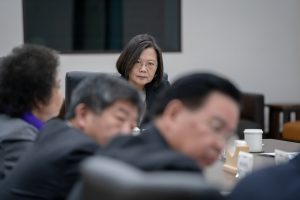Taiwan has confirmed its first Wuhan coronavirus case and closed its borders to all residents of Wuhan amid concerns that the country’s exclusion from the World Health Organization (WHO) is keeping it from receiving timely updates on the deadly epidemic.
Chinese authorities imposed a lockdown on Wuhan and two neighboring cities on Thursday, effectively barring residents from leaving the cities. All direct flights between Taiwan and Wuhan were canceled as of Thursday, with Taiwanese carriers China Airlines and Mandarin Airlines announcing cancellations through February 27.
Taiwan’s Centers for Disease Control (CDC) said on Tuesday a 55-year-old woman working in Wuhan tested positive for the coronavirus after arriving at Taoyuan International Airport on Monday and telling quarantine officials she was suffering from a fever.
A CDC spokesperson said on Wednesday that the woman has experienced slight shortness of breath while walking but is in stable condition.
As of Wednesday, 12 other individuals were under quarantine due to potential cases of the virus, according to the CDC, while 26 people have been tested.
Taiwan President Tsai Ing-wen on Wednesday urged China to share information on the viral outbreak and said the country’s international airports were enforcing “very strict” epidemic prevention measures.
The CDC confirmed that Chinese officials had shared information on the coronavirus with Taipei. There is currently no formal mechanism for the two sides to communicate; Beijing broke all government-level dialogue with Taipei after Tsai was first elected in 2016.
Tsai also called on the WHO to allow Taiwan to participate in dialogues, hours before a WHO group of independent experts gathered to discuss the outbreak.
Taiwan is not a member of the WHO because of Beijing’s objections. In the past, Taipei was invited to join the World Health Assembly as an observer, but it has been barred from even that since Tsai’s 2016 election, again due to pressure from Beijing. Chinese leadership claims sovereignty over Taiwan, despite never having ruled the island, and consider Tsai to be an advocate of Taiwan’s formal independence, a stance she has never verbalized while in office.
An unnamed senior United States State Department official also called for Taiwan’s inclusion in the WHO on Wednesday, according to Taiwan’s state-run Central News Agency.
“We would encourage further incorporation of Taiwan in the WHO instead of trying to exclude them,” the official said, stressing its importance as “corona cases are popping up in Taiwan.”
The outbreak has sparked global concerns that residents of Wuhan potentially exposed to the virus have already traveled outside of the city ahead of this weekend’s Lunar New Year celebrations.
Over 1 million Taiwanese work or live in China, many of whom will travel home for the Lunar New Year holiday, including employees at a Foxconn plant in Wuhan who have already returned to Taiwan.
Foxconn asked those employees not to attend a Thursday year-end party in Taipei and to stay home for the holidays, although it said no Wuhan-based employees had shown any signs of health problems.
At least 17 people have died in China from the virus and over 600 are confirmed infected.
Aside from China and Taiwan, there are now three confirmed cases in Thailand, two in Macau, and one each in Japan, South Korea, Singapore, Saudi Arabia and the United States, according to CNN.
Taiwan has prepared by establishing a “central epidemic command center,” forming government response teams, and disseminating information through media and social media platforms, Tsai said on Wednesday.
But Taiwan is still barred from attending WHO assemblies and is excluded from the International Civil Aviation Organization (ICAO), despite the high influx of passengers in its international airports, including incoming passengers from China.
On Wednesday, Tsai and Vice President Chen Chien-jen recalled the 2003 SARS outbreak, during which WHO specialists only visited Taiwan after two SARS-related deaths there.
Taiwanese officials – including Chen, a doctor who was Taiwan’s health minister in 2003 – have experience managing regional outbreaks but have been relegated to being “a passive recipient of thirdhand information,” Lowy Institute research fellow Natasha Kassam wrote in a Wednesday op-ed in Foreign Policy.
It’s a position Taiwan and other countries have echoed for years. Last May, countries including the United States, Japan, Germany, and Australia spoke in support of Taiwan’s inclusion in the annual World Health Assembly summit in Geneva, Switzerland. Taiwan was ultimately barred from participating.
On Wednesday, Chinese Foreign Ministry spokesperson Geng Shuang said that countries “must abide by the One China Principle” to take part in international organizations, such as the WHO.
“No one cares more about the health of the Taiwanese people than the Chinese Central Government,” he said.
Geng’s comments were predictably met with derision in Taiwan, where citizens concerned with the outbreak’s rapid global spread see this as the wrong time for Beijing to play cross-strait politics.

































